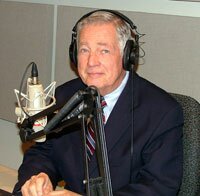NEWS- The war is over: Robertson plays taps for Civil War series

Dr. James Robertson did his audition tape in one take, and WVTF knew it had a winner.
PHOTO COURTESY WVTF
For 14 years, listeners in the vast WVTF broadcast area have awakened at 6:50 every Friday morning to the dulcet, southside Virginia accent of Dr. James "Bud" Robertson, Virginia Tech distinguished professor, talking about the Civil War. But on Friday, August 24, the war ended– or at least Robertson's long-running series.
"I've done over 300, and that's enough," says Robertson, 77, from his Blacksburg home. "Doing the show is like digging in the ground: the deeper you dig, the harder it gets."
To be exact, Robertson has done 312 shows, the first one airing September 3, 1993. "This is the most popular series we've ever produced and aired," says WVTF news director Rick Mattioni.
He credits Virginia Tech spokesman Larry Hincker with coming up with the idea of weekly "radio vignettes on the Civil War."
Mattioni recalls having lunch with Robertson in Christiansburg. "He'd written a couple of samples," says Mattioni. "I said, ‘Why don't we record here in the parking lot?' He did, in one take."
When Mattioni got back to the station, he listened again and thought it would make good radio. "I put some music under it and thought, 'Uh-oh, we've got something here,'" he says.
And once the series aired, "People were going nuts for this stuff," Mattioni says. Before WVTF had streaming radio on the Internet, people who lived out of the area would call the station and ask to be put on hold during Robertson's show– it airs at 6:50, 8:50am and noon– so they could hear it.
While Morning Edition listeners may be aware of Robertson only from the Civil War Series, he was a well-established authority on the Civil War long before WVTF came calling. He has appeared on A&E, the History Channel, and public TV, and was the chief consultant on the 2003 movie Gods and Generals. And he still teaches a huge Civil War class at Virginia Tech.
Robertson "inherited" his passion for the Civil War from growing up in Danville, where the war was "not that long ago," he says.
"I remember sitting on my grandmother's lap and her telling me what her father did in the Civil War– he was in the Confederate Army," he says.
His most popular shows, he says, have dealt with animals, such as Stonewall Jackson's horse or "Little Sally," a Boston terrier with the Pennsylvania regiment whose tale had some listeners in tears.
"It's a daunting task, not only to record these programs, but to write high-quality, entertaining essays of this caliber," says Glenn Gleixner, WVTF general manager.
The pattern has been to air 52 shows, then re-air them the following year. Gleixner has never heard any complaints about re-runs. "They're so engaging, you always pick up something new," he says.
In fact, for those who can't give up their Civil War Series fix, WVTF plans to put an archived show on its website each week starting September 7.
Charlottesville architect Gate Pratt is a long-time listener to NPR on WVTF, and when he first heard the Civil War Series, "I always thought it a little unusual and strange," he says. "I couldn't tell if it was appropriate.
"It is history," concedes Pratt, but he wondered, "How long do we keep rehashing the Civil War?" Pratt, a Southerner himself, points out that "Southerners love to talk about their history, analyzing the battles in case we have to fight them again."
He confesses mixed feelings– both sadness and relief– at the end of the show.
But Gleixner believes the show's success is more than the South still fighting the Civil War. "If you really listen to the program, the Civil War is almost a backdrop to something deeper," he says. "[Robertson's] essays focus not just on the South or North. He takes an intimate look at folks from all walks of life. You hear about generals, washerwomen, pets. Every aspect of the human experience is looked at through the backdrop of the Civil War."
"We're not fighting the Civil War any more than we're still fighting the American Revolutionary War," Robertson says. "I'm not a military historian. I'm a social historian interested in people, emotion."
But, warns the historian, "We can't forget our past."
Robertson's stepping away from the microphone doesn't mean he's retiring. He's still head of the Virginia Center for Civil War Studies, which should be back in the news as the war's sesquicentennial approaches.
The series has given Robertson a bit of fame as soon as he opens his mouth that wouldn't have come from his award-winning books, such as General A.P. Hill.
"Oh gosh yes; anywhere I go, people recognize me," Robertson says in the distinctive accent that's become a key voice of the Civil War.
#